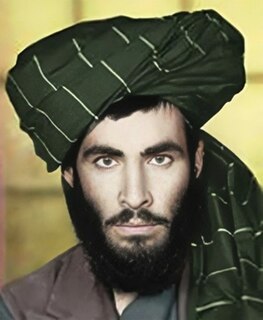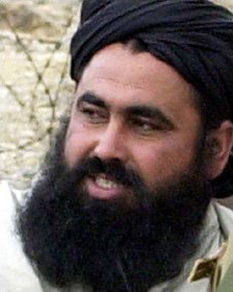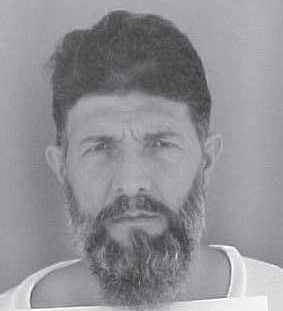Related Research Articles

Al-Qaeda is a militant Sunni Islamist multinational network of Islamic extremists and Salafist jihadists. It was founded in 1988 by Osama bin Laden, Abdullah Azzam, and several other Arab volunteers during the Soviet–Afghan War.

The Taliban, which refers to itself as the Islamic Emirate of Afghanistan, Taliban Islamic Movement and/or Islamic Movement of Taliban is a Deobandi-Pashtun Islamic fundamentalist, militant Islamist, and jihadist political movement and military organization in Afghanistan. Currently one of two entities claiming to be the legitimate government of Afghanistan, alongside the internationally recognized Islamic Republic of Afghanistan, the Taliban have de facto control of the country. The Taliban's ideology has been described as combining an "innovative" form of Sharia Islamic law which is based on Deobandi fundamentalism and militant Islamism, combined with Pashtun social and cultural norms which are known as Pashtunwali, because most Taliban are Pashtun tribesmen. The group is internally funded by its involvement in the illegal drug trade which it participates in by producing and trafficking in narcotics such as heroin, extortion, and kidnapping for ransom. They also seized control of mining operations in the mid-2010s that were illegal under the previous government.

Ghazi Mohammed Omar Mujahid was an Afghan political and religious leader. He was a co-founder of the Taliban and served as its 1st Supreme Leader. He founded the Islamic Emirate of Afghanistan in 1996.

Jaish-e-Mohammed is a Pakistan-based Deobandi Jihadist Mujahideen group active in Kashmir which is widely considered as a terrorist group. The group's primary motive is to separate Kashmir from India and merge it into Pakistan.
Mohammad Masood Azhar Alvi is a radical Islamist and terrorist, being the founder and leader of the Pakistan-based terrorist organisation Jaish-e-Mohammed, active mainly in the Pakistani-administered portion of the Kashmir region. His actions are not limited to the South Asian region, for instance BBC News describing him as "the man who brought jihad to Britain." On 1 May 2019, Masood Azhar was listed as an international terrorist by United Nations Security Council.

The Hezb-e-Islami Gulbuddin, also referred to as Hezb-e-Islami or Hezb-i-Islami Afghanistan (HIA), is an Afghan political party and former militia, originally founded in 1975 as Hezb-e-Islami and led by Gulbuddin Hekmatyar. In 1979, Mulavi Younas Khalis split with Hekmatyar and established his own group, which became known as Hezb-i Islami Khalis; the remaining part of Hezb-e Islami, still headed by Hekmatyar, became known as Hezb-e Islami Gulbuddin. Hezbi Islami seeks to emulate the Muslim Brotherhood and to replace the various tribal factions of Afghanistan with one unified Islamic state. This puts them at odds with the more tribe-oriented Taliban.

Nek Muhammad Wazir was a prominent Pakistani mujahideen or jihadi leader. He was killed in a US drone strike in South Waziristan, FATA, Pakistan in 2004. This was the first CIA drone strike inside Pakistan.

Baitullah Mehsud was a leading terrorist in Waziristan, Pakistan, and the leader of the Tehrik-i-Taliban Pakistan (TTP). He formed the TTP from an alliance of about five militant groups in December 2007. He is thought by U.S. military analysts to have commanded up to 5,000 fighters and to have been behind numerous attacks in Pakistan including the assassination of Benazir Bhutto which he and others have denied.

Jalaluddin Haqqani was an Afghan insurgent commander who founded the Haqqani network, an insurgent group fighting in guerilla warfare against US-led NATO forces and the now former government of Afghanistan they support.

Harkat-ul-Jihad-al-Islami is a Pakistani Islamic fundamentalist organisation most active in South Asian countries of Pakistan, Bangladesh and India since the early 1990s. It was banned in Bangladesh in 2005.

The 1996–2001 Afghan Civil War took place between the Taliban's conquest of Kabul and their establishing of the Islamic Emirate of Afghanistan on 27 September 1996, and the US and UK invasion of Afghanistan on 7 October 2001: a period that was part of the Afghan Civil War that had started in 1989, and also part of the war in Afghanistan that had started in 1978.
Shahzada Akhund, known also by the title Mullah, was a Taliban field commander who was held in extrajudicial detention in Guantanamo. He used a false name, Mohammed Yusif Yaqub, and pretended to be an innocent civilian.

Sipah-e-Sahaba Pakistan, renamed to Millat-e-Islamia, is a Muslim organisation in Pakistan, which also functioned as a political party. It broke away from the main Deobandi Sunni organisation Jamiatul Ulema-e-Islam in 1985. Established in Jhang by Haq Nawaz Jhangvi, it was banned by President Pervez Musharraf in 2002 as a terrorist organization under the Anti-Terrorism Act of 1997. In March 2012, the government of Pakistan banned Sipah-e-Sahaba again. The government of the United Kingdom banned the group earlier in 2001.

Mohammed Naim Farouq is a citizen of Afghanistan who was held in extrajudicial detention in the United States Guantanamo Bay detention camps, in Cuba. His Guantanamo Internment Serial Number was 633.
Lashkar-e-Islam, literally Army of Islam also transliterated as Lashkar-e-Islami, Lashkar-i-Islam) is a militant organization active in and around Khyber Agency, Federally Administered Tribal Areas, Pakistan. LeI was founded in 2004 by Mufti Munir Shakir. The most recent leader was Mangal Bagh. On March 12, 2015, Lashkar-e-Islam announced that it was joining Tehrik-i-Taliban Pakistan. Pakistan banned the organization in June 2008.

Afghanistan and Pakistan border with one another; both have become members of the South Asian Association for Regional Cooperation. Relations between the two countries have been strained since 1947, when Pakistan gained independence and Afghanistan was the sole country to vote against Pakistan's admission into the UN. Afghanistan immediately armed separatist movements in the nascent Pakistan and made irredentist claims to large swathes of Pakistani territory—which prevented the emergence of normalised ties between the two countries. Further tensions have arisen with various issues related to the War in Afghanistan (1978–present), and with the millions of Afghan refugees who have sought shelter in Pakistan since the start of that war, water rights, the growing relations of India and Afghanistan.

Tehrik-i-Taliban Pakistan, alternatively referred to as the Pakistani Taliban, is a Pashtun Islamist armed student group that is an umbrella organization of various student militant groups based along the Afghan–Pakistani border. Most Taliban groups in Pakistan coalesce under the TTP. In December 2007, about 13 groups united under the leadership of Baitullah Mehsud to form the TTP.
Pakistan and state-sponsored terrorism refers to the involvement of Pakistan in terrorism through the backing of various designated terrorist organizations. Pakistan has been frequently accused by various countries, including its neighbours Afghanistan, India, and Iran, as well as by the United States, the United Kingdom, Germany, and France, of involvement in a variety of terrorist activities in both its local region of South Asia and beyond. Pakistan's northwestern tribal regions along the Afghanistan–Pakistan border have been described as an effective safe haven for terrorists by Western media and the United States Secretary of Defense, while India has accused Pakistan of perpetuating the insurgency in Jammu and Kashmir by providing financial support and armaments to militant groups, as well as by sending state-trained terrorists across the Line of Control and de jure India–Pakistan border to launch attacks in Indian-administered Kashmir and India proper, respectively. According to an analysis published by the Saban Center for Middle East Policy at the Brookings Institution in 2008, Pakistan was reportedly, "with the possible exception of Iran, perhaps the world's most active sponsor of terrorist groups... aiding these groups that pose a direct threat to the United States. Pakistan's active participation has caused thousands of deaths in the region; all these years Pakistan has been supportive to several terrorist groups despite several stern warnings from the international community." Daniel Byman, a professor and senior analyst of terrorism and security at the Center For Middle East Policy, also wrote that, "Pakistan is probably 2008's most active sponsor of terrorism". In 2018, the former Prime Minister of Pakistan, Nawaz Sharif, suggested that the Pakistani government played a role in the 2008 Mumbai attacks that were carried out by Lashkar-e-Taiba, a Pakistan-based Islamist terrorist group. In July 2019, Pakistani Prime Minister Imran Khan, on an official visit to the United States, acknowledged the presence of some 30,000–40,000 armed terrorists operating on Pakistani soil. He further stated that previous administrations were hiding this truth, particularly from the United States, for the last 15 years during the War on Terror.

Tehreek-e-Nafaz-e-Shariat-e-Mohammadi is a Salafi Islamic extremist militant group in Pakistan whose objective is to enforce Sharia law in the country.

The Afghanistan conflict is a continuous series of wars fought in Afghanistan from 1978 through to the present day.
References
- 1 2 Taliban pause for fresh breath, Asia Times , July 19, 2006
- ↑ Syed Saleem Shahzad (June 9, 2006). "Taliban take the fight to the country". Asia Times. Archived from the original on June 13, 2006. Retrieved 2007-11-10.CS1 maint: unfit URL (link)